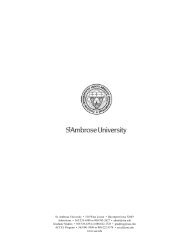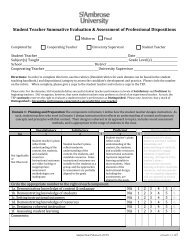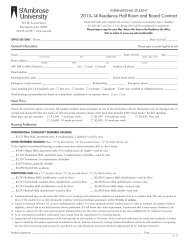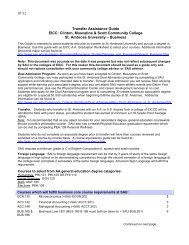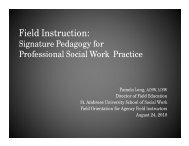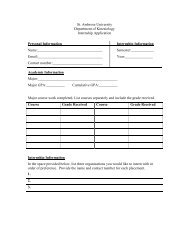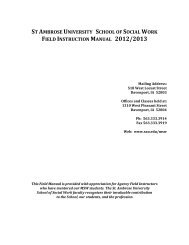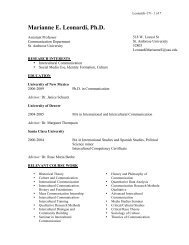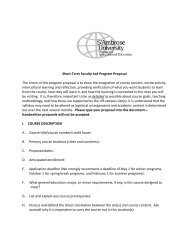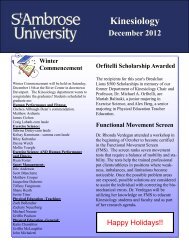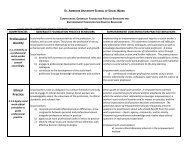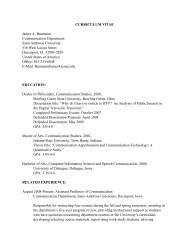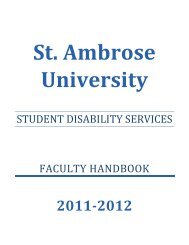St. Ambrose University 518 West Locust Davenport Iowa 52803 admit
St. Ambrose University 518 West Locust Davenport Iowa 52803 admit
St. Ambrose University 518 West Locust Davenport Iowa 52803 admit
You also want an ePaper? Increase the reach of your titles
YUMPU automatically turns print PDFs into web optimized ePapers that Google loves.
Undergraduate Programs<br />
graphic, symbolic, verbal and mental representations<br />
of mathematical ideas. Incorporates constructive<br />
activities to help children develop mathematical<br />
reasoning and to understand fundamental<br />
operations of addition, subtraction, multiplication<br />
and division. Prerequisite: ECE 303.<br />
ECE 365. Early Childhood Development 3 credits<br />
Child growth and development for infants, toddlers,<br />
preprimary and primary school children,<br />
both typical and atypical in areas of cognition,<br />
communication, physical motor, social-emotional,<br />
aesthetics and adaptive behavior. <strong>St</strong>udents<br />
explore individual differences in development and<br />
learning, including risk factors, developmental<br />
variations and developmental patterns of specific<br />
disabilities and special abilities. Prerequisites:<br />
EDUC 205, 284.<br />
ECSE 204. Introduction to Early Childhood<br />
Education, Birth to Age 8<br />
3 credits<br />
An overview of intervention from birth through<br />
the age eight population including typical infants,<br />
toddlers, preprimary and primary children and<br />
those with special health concerns, developmental<br />
delays, and at-risk conditions including children<br />
with sensory impairments, physical disabilities,<br />
emotional and behavioral disorders, and learning<br />
disabilities. Applies theories and knowledge of<br />
dynamic roles and relationships between families,<br />
schools, and communities. Identifies resources<br />
and service delivery options in meeting the needs<br />
of children birth through age eight and develops<br />
an understanding of the Individual Family Service<br />
Plan (IFSP) and the Individual Education Plan<br />
(IEP) process. Prerequisites: EDUC 205, ECE 365<br />
taken concurrently.<br />
ECSE 311. Assessment of Young<br />
Children<br />
3 credits<br />
Teaches skills in administrating informal and formal<br />
assessments and in interpreting information<br />
from testing and observation for the purpose of<br />
+ = Applicable toward general education degree requirements<br />
WI = Writing intensive course<br />
monitoring development and planning intervention<br />
for young children. Links assessment techniques<br />
to planning, implementing and evaluation<br />
curriculum goals and teaching practices for<br />
infants, toddlers, preprimary and primary children<br />
based on the needs and interests of individual<br />
children, their families, and community.<br />
Prerequisites: EDUC 205, 209; ECE 365.<br />
ECSE 410. Infant Toddler Curriculum<br />
and Methods<br />
3 credits<br />
<strong>St</strong>udents will plan, implement and learn to evaluate<br />
developmentally and individually appropriate<br />
curriculum goals, content and teaching practices<br />
for infants and toddlers based on the needs and<br />
interests of individual children and their families.<br />
Techniques for adapting material, equipment and<br />
the environment will be emphasized to meet<br />
social, cognitive, physical motor, communication,<br />
and medical needs for children of varying abilities.<br />
25 field hours required. Prerequisites: ECE<br />
306, 350.<br />
ECSE 420. Developmental Curriculum and<br />
Methods: Ages 3 to 6<br />
3 credits<br />
<strong>St</strong>udents will develop and implement learning<br />
experiences for pre-primary children with focus<br />
on multicultural content that includes development<br />
of responsibility and aesthetic, artistic,<br />
physical, cognitive, language, emotional and<br />
social development. Through developmentally<br />
and individually appropriate curriculum goals,<br />
content and teaching practices, students learn to<br />
adapt materials, equipment, the environment,<br />
programs and resources to meet the diverse learning<br />
needs of pre-primary children. 25 field hours<br />
required.<br />
ECSE 434. <strong>St</strong>udent Teaching Early Childhood<br />
Special Education<br />
6 credits<br />
For students seeking endorsement in ECSE and<br />
PK-K (Option 1). Directed observation and<br />
supervised teaching experience. The student is<br />
required to spend a full day, five days a week for<br />
one-half a semester in an approved early child-<br />
88



